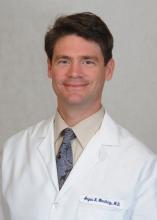LAKE BUENA VISTA, FLA. – Workforce gaps loom large in rheumatology, but efforts on both the federal and state levels address the problem, according to the chair of the American College of Rheumatology’s Government Affairs Committee, Angus B. Worthing, MD.
“We have a workforce gap that’s growing in adult arthritis; demand is increasing, and supply is decreasing,” Dr. Worthing said during an update on the committee’s activities at the annual meeting of the Florida Society of Rheumatology.
A similar “grave discrepancy” plagues pediatric rheumatology, said Dr. Worthing, a partner in a private rheumatology practice in the Washington, D.C., area.
“But these are fundamentally different,” he said, explaining that there is an oversupply of applicants for adult rheumatology fellowship spots, whereas only half of the available spots in pediatric rheumatology are being filled.
“We’re unfortunately having to turn away highly qualified [adult rheumatology] applicants, because we don’t have enough money to fund fellowship positions in the United States; about 100 doctors a year who wanted to be rheumatologists are going into other specialties,” he said. “It’s a different problem in pediatric rheumatology where you spend 2-3 extra years to earn less money than you would as a general pediatrician.”
The American College of Rheumatology is working to “find those dollars,” to alleviate the problems, he said, encouraging those who are concerned about the workforce issues to consider investing in the Rheumatology Research Foundation, which is a “huge supporter of rheumatology fellowships.”
Another proposal involves loan repayment plans for health professionals who agree to work at least 2 years in pediatric medicine.
“There’s an active bill that you can send an e-mail on right now,” Dr. Worthing said.
The bill, titled the “Educating Medical Professionals and Optimizing Workforce Efficiency and Readiness [EMPOWER] for Health Act,” represents an effort on the federal level to increase access to pediatric medical subspecialists by increasing the number who practice in underserved areas.
“It was introduced the day after we spoke on the Hill in May to leaders about this [issue],” he said.
Another effort is underway in Georgia, where a legislator who has lupus is working with the ACR on legislation that would allow the state to repay up to $25,000 on loans for cognitive specialists who agree to work in the state for a period of time.
The ACR is also working to maintain Deferred Action for Childhood Arrivals (DACA) protections for recipients pursuing medical education, who could potentially help to alleviate the shortages, he noted.
The problem of workforce issues is multifaceted and it requires a multipronged approach, Dr. Worthing said.
“It will not be solved by the American College of Rheumatology alone; I think it will end up being solved by people on the ground working with their primary care physicians and referring doctors to try to close the gap and try to see patients when they’re needed,” he said.
Dr. Worthing reported having no disclosures.


